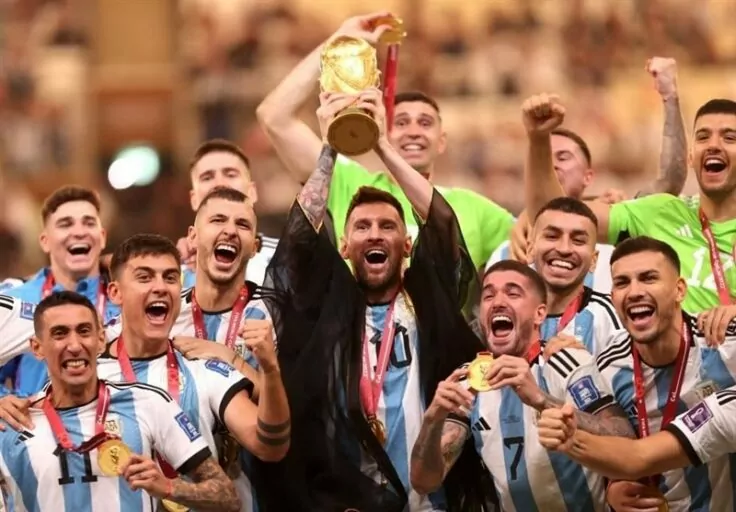Those that followed the 2022 edition of the FIFA World Cup in Qatar, even just remotely, can all probably agree on the fact that this year’s iteration was an emotional rollercoaster from the moment the tournament kicked off on Nov. 20 until its very last fixture, the much-awaited final, which saw 2018 victors France face off against Lionel Messi’s Argentina.
From Morocco’s prodigious run to the semi-finals, Saudi Arabia’s historic win against La Albiceleste, Germany’s surprising elimination by Japan, and the nerve-racking final that had to be settled via a tense penalty shoot-out, it’s clear that it will take a lot to match the level of dramaturgy seen in the first World Cup held in the Arab World.
I’m sorry but this World Cup has to be submitted to the Oscars, Emmys, Golden globes and all the film festivals
This is masterful, Qatar take a bow 😭
— kanki ✨ (@bolu_ay) December 18, 2022
While history was repeatedly made across the several weeks of the global sporting competition, Western news agencies, journalists, and pundits collectively turned stoking controversies into a weekly hobby and practice as not a single day went by without hearing another heated conversation about something Qatar had supposedly done wrong, despite the almost unanimous satisfaction of fans that made their way to Doha for the quadrennial tournament.
Yes, it’s true that there are many things the tiny Gulf country could, and most importantly should, have done better, before organizing a World Cup on the region’s soil. However, it seems that there has been a semi-obsession at pointing fingers towards Qatar for its wrongdoings when previous iterations of the tournament followed similar paths without receiving as much criticism or backlash. As much as many of the adverse reactions seen so far do indeed stand and are undeniably legitimate, many others felt like hidden xenophobia, disguised Orientalism, and camouflaged bigotry — and the latest scandal to have risen only seems to confirm our preceding statement.
Apart from Qatar hosting a wonderful World Cup, the only thing exposed by the media is the blatant Islamophobia exhibited by western media.
— ruth (@theruthuntold_) December 19, 2022
Last night, septuple Ballon D’Or winner Lionel Messi finally put his hands on one of the world’s most sought-after prizes, the World Cup, 36-years-after the Latin American country’s last, saddening France on its attempt at winning the prize back-to-back, four year’s after their initial triumph in Russia in 2018. Finally putting an end to all debates around who’s the best player of all time, the Argentina-born athlete somehow found himself stuck in a storm of negative comments and depreciating remarks after being gifted a traditional bisht when accepting the hard earned trophy onstage.
For those that might be unfamiliar with the noise-generating item of clothing, the bisht refers to a long, sheer, black cloak with gold trimming, typically made of camel hair and goat wool. It is usually worn during important ceremonies, festivities, and events. Primarily worn in the Arab peninsula, the gifting of such a garment is customarily understood as a sign of appreciation and respect, and given the incredible accomplishment, coupled with the fact that Messi finally bagged the only prize that eluded him, his wearing of the cloak only seemed fitting and appropriate. But, that opinion was far from making consensus.
Lineker and the BBC had best explain what the issue was with Messi wearing a traditional Arab desht (robe)? “Seems a shame”, why?🤔
The flood of anti-Arab/Islamophobic commentary on BBC this WC has been appalling!#BBC #ArgentinaVsFrance #WorldCupFinal #Qatar2022 pic.twitter.com/NDU0dvaWMw
— Robert Carter 🇲🇦 🏆 (@Bob_cart124) December 18, 2022
In the few hours following Argentina’s win, the Internet was quickly flooded with patronizing, disrespectful, and quite frankly even offensive, headlines claiming that organizers, including government officials, tried to appropriate Messi’s win, steal his team’s spotlight, and sportswash Qatar, going as far as dramatically labeling the gesture of receiving and wearing the robe as a “bizarre act that ruined the greatest moment in World Cup history” per The Telegraph.
Reading through the slew of newspaper titles, Tweets, and Instagram posts has seriously got us wondering how much more out of touch can one get? The courtesy of the gift, especially of the bisht in particular, was understood by all those who are already acquainted with it or those that simply took the time to Google it, as a considerate and reverential act, magnifying Messi and his team’s success on the international stage.
If anything, the reactions put forward only show some of the Western World’s true colors, their perception of anything outside the euro-centric bubble, and the extent they are willing to reach to demonize anything hailing from our side of the world. As many users have pointed out, an emir making you wear a bisht is a big honor. It’s kind of like the equivalent of being knighted, so anyone criticizing the act needs to educate themselves first.
Sure, we can let the everyday netizen get away with their silly takes on the offering, blaming ignorance for some of the insensitive discourse seen spread across social media, but when it comes to news agencies, journalists, and pundits, AKA people that are supposed to fact check what they say before they speak for a living, the wave of dismay only exposed the deeply rooted prejudice they seem to have for others — especially for our culture.
If anyone has tried to steal the spotlight of this FIFA World Cup, it’s going to have to be everyone but Qatar. And, if we’re being completely honest, we’re going to have to point our fingers at the West’s consistent bad mouthing of the host country, trying to dim the Gulf State’s light after what is probably the best organized edition of all time. In other words, the only “bizarre act” we’ve seen this whole tournament has come from those that tried to label pretty much anything as such.









